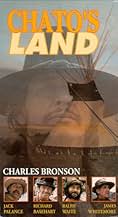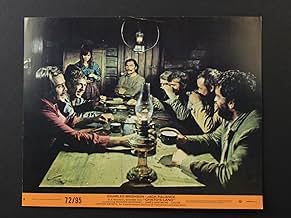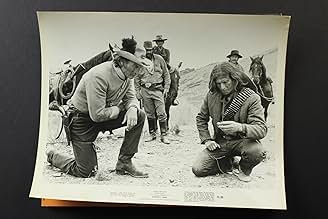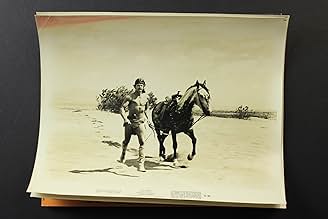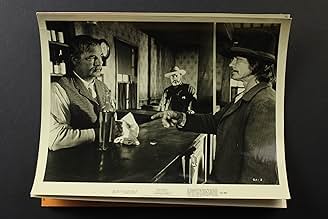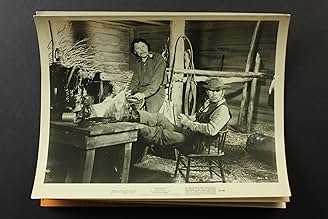AVALIAÇÃO DA IMDb
6,6/10
6,9 mil
SUA AVALIAÇÃO
Nos anos 1870 no Novo México, um mestiço mata um xerife em autodefesa, mas o gangue que eventualmente o persegue se encontra em território perigoso.Nos anos 1870 no Novo México, um mestiço mata um xerife em autodefesa, mas o gangue que eventualmente o persegue se encontra em território perigoso.Nos anos 1870 no Novo México, um mestiço mata um xerife em autodefesa, mas o gangue que eventualmente o persegue se encontra em território perigoso.
Avaliações em destaque
There's a little in-joke that's included in Pardon Chato's (Charles Bronson) only line spoken in English; and that occurs in about the second minute of this savagely entertaining story about vigilantism running amok somewhere in the Old West.
We see Chato, at the saloon bar, waiting to get his whiskey when in comes the local Marshall Endersby (Jacob Meade), looking to kill himself an uppity mestizo. So, here's the in-joke: just before the Marshall draws to shoot, Chato says: "Back off, lawman!" Then he spins quickly, shooting from the hip to kill the Marshall. It's a joke, because the director, Michael Winner, in 1971, had already filmed a story called Lawman (by the same screen writer, Gerald Wilson) in which a Marshall hunts down a group of men – relentlessly, mercilessly and legally. (Note that Lawman is more highly regarded, at IMDb, than Chato's Land.)
Anyway, the story of Chato is double joke: here, the Marshall is out of the picture (no pun intended) immediately, and the hunters – the Posse Commitatus, a mixed bunch of misfits headed up by either ex-Captain Whitmore (Jack Palance) or Jubal Hooker (Simon Oakland), depending on how the plot unfolds – become the hunted when Chato begins the task of killing them – relentlessly, mercilessly...but, illegally, in this story. Oh, Chato has the moral high ground, many would argue; but, objectively, any court would find him guilty of manslaughter at the very least. And, man, what a slaughter it is! But, this is the Old West, where just about anything goes.
The story has many antecedents (about which Winner and Wilson would have been well aware): The Bravados (1958) with Gregory Peck as the hunter; Hombre (1967) with Paul Newman as the despised mestizo; and Valdez is Coming (1971) with Burt Lancaster as the hunter, and a Mexican to boot. You could probably add to that list. This film adds to it, of course, as being just another take on the good, ol' American pastime of vigilantes racing off to git themselves a hangin' afore nightfall, if possible. In that regard and if you have seen it, you shouldn't miss watching the heartbreak in The Oxbow Incident (1943) with Henry Fonda, heading up an all-star cast, who tries to stop the west's favorite method of dispensing rough justice.
The best part about Chato's Land is the land: the stark, unforgiving country that Chato uses to his advantage. Winner makes good use of long, wide angle shots to emphasize the harsh, bleak landscape; but, his studied close-ups of the characters are often almost works of art. Of the cinematography, I can only complain of the lighting – a good lot of the shoot was completed in pseudo-darkness, using blue filters, no doubt, and was quite annoying at times. Editing is up to par, though, and Jerry Fielding's music is suitably moody – although, I could have done without the military-type snippets.
After speaking that one English line, Chato sticks to Apache, or is silent throughout, as he gets on with his task. So, it's nice to see a man happy in his work, and who doesn't bother us with useless talk.
Highly recommended for all fans of Bronson and Palance.
We see Chato, at the saloon bar, waiting to get his whiskey when in comes the local Marshall Endersby (Jacob Meade), looking to kill himself an uppity mestizo. So, here's the in-joke: just before the Marshall draws to shoot, Chato says: "Back off, lawman!" Then he spins quickly, shooting from the hip to kill the Marshall. It's a joke, because the director, Michael Winner, in 1971, had already filmed a story called Lawman (by the same screen writer, Gerald Wilson) in which a Marshall hunts down a group of men – relentlessly, mercilessly and legally. (Note that Lawman is more highly regarded, at IMDb, than Chato's Land.)
Anyway, the story of Chato is double joke: here, the Marshall is out of the picture (no pun intended) immediately, and the hunters – the Posse Commitatus, a mixed bunch of misfits headed up by either ex-Captain Whitmore (Jack Palance) or Jubal Hooker (Simon Oakland), depending on how the plot unfolds – become the hunted when Chato begins the task of killing them – relentlessly, mercilessly...but, illegally, in this story. Oh, Chato has the moral high ground, many would argue; but, objectively, any court would find him guilty of manslaughter at the very least. And, man, what a slaughter it is! But, this is the Old West, where just about anything goes.
The story has many antecedents (about which Winner and Wilson would have been well aware): The Bravados (1958) with Gregory Peck as the hunter; Hombre (1967) with Paul Newman as the despised mestizo; and Valdez is Coming (1971) with Burt Lancaster as the hunter, and a Mexican to boot. You could probably add to that list. This film adds to it, of course, as being just another take on the good, ol' American pastime of vigilantes racing off to git themselves a hangin' afore nightfall, if possible. In that regard and if you have seen it, you shouldn't miss watching the heartbreak in The Oxbow Incident (1943) with Henry Fonda, heading up an all-star cast, who tries to stop the west's favorite method of dispensing rough justice.
The best part about Chato's Land is the land: the stark, unforgiving country that Chato uses to his advantage. Winner makes good use of long, wide angle shots to emphasize the harsh, bleak landscape; but, his studied close-ups of the characters are often almost works of art. Of the cinematography, I can only complain of the lighting – a good lot of the shoot was completed in pseudo-darkness, using blue filters, no doubt, and was quite annoying at times. Editing is up to par, though, and Jerry Fielding's music is suitably moody – although, I could have done without the military-type snippets.
After speaking that one English line, Chato sticks to Apache, or is silent throughout, as he gets on with his task. So, it's nice to see a man happy in his work, and who doesn't bother us with useless talk.
Highly recommended for all fans of Bronson and Palance.
A tale of western revenge, "Chato's Land" has a cast of many well known actors including Jack Palance, Richard Basehart, Simon Oakland, Ralph Waite, Victor French and James Whitmore as well as Bronson in the lead role as Pardon Chato.
Chato is a half-breed Apache who makes the mistake of visiting a town that is hostile towards Indians. Being set upon by the sadistic town Marshall, Chato kills the lawman in self defense and must run from a posse of the town's people led by Jack Palance as Quincy Whitmore. Palance is excellent as Whitmore, an ex-Confederate officer who still longs after the excitement that comes from waging war. Leading the town's men in pursuit of Chato, Whitmore is decked out in his Confederate officer's jacket and plummed hat. Along with Whitmore is Nye Buell (Basehart) dressed in top hat and frock coat offering his whiskey laden salty commentary along the way. Simon Oakland also does a fine job as Jubal Hooker, the vicious elder of the degenerate Hooker clan who takes control of the posse from Quincy and ultimately cause the death of several of the posse members.
This movie has some beautifully set scenery that captures the harshness of the desert land that Chato takes refuge in. Whitmore comments that the harsh land is something that a white man would just damn off to hell and forget, but to Chato who doesn't ask much or take much from the land, it is almost a living thing.
Chato is a half-breed Apache who makes the mistake of visiting a town that is hostile towards Indians. Being set upon by the sadistic town Marshall, Chato kills the lawman in self defense and must run from a posse of the town's people led by Jack Palance as Quincy Whitmore. Palance is excellent as Whitmore, an ex-Confederate officer who still longs after the excitement that comes from waging war. Leading the town's men in pursuit of Chato, Whitmore is decked out in his Confederate officer's jacket and plummed hat. Along with Whitmore is Nye Buell (Basehart) dressed in top hat and frock coat offering his whiskey laden salty commentary along the way. Simon Oakland also does a fine job as Jubal Hooker, the vicious elder of the degenerate Hooker clan who takes control of the posse from Quincy and ultimately cause the death of several of the posse members.
This movie has some beautifully set scenery that captures the harshness of the desert land that Chato takes refuge in. Whitmore comments that the harsh land is something that a white man would just damn off to hell and forget, but to Chato who doesn't ask much or take much from the land, it is almost a living thing.
Chato's Land was a pleasant surprise, due to its mixed reception and that the type of film that it falls under is not always my thing I was not expecting an awful lot. But seeing as the cast was a good one on paper I thought, why not? Chato's Land is not going to be for everybody, it's very gritty and violent(some of it being not for the faint-hearted, the most memorable of it actually being very brutal) and Michael Winner's films are the kind that will entertain some and not be others' cup of tea.
The film is a touch overlong and gets a bit draggy in spots, while the ending is rather abrupt and rushed- sure it was intended to be ambiguous but for me there was the feeling of uncertainty of how to end it- and the day-for-night lighting/shooting is awfully obvious. Jerry Fiedler's music score compliments the film well and dynamically orchestrated but could have had a more sweeping punch and with less of a TV series and workmanlike pace. However Chato's Land was a pretty good film, apart from the day-for-night it's reasonably well made with splendidly gritty scenery and handsome photography that suits the atmosphere. Chato's Land is also very intelligently scripted with some remarkably literate dialogue, the direction from Michael Winner is above competent at least pacing and technically-wise and the story mostly is well-paced and compelling.
In terms of action, that in Chato's Land is sparse but when it does appear it really does pack a punch. For an action/Western film, what was really impressive about Chato's Land was the way the characters are written. The characters here are very interesting and with plenty of layers, Captain Whitmore is a very multi-faceted character and perhaps the most multi-faceted role of Jack Palance's career. The great performances help(apart from for my tastes the hammy one of Richard Jordan), Charles Bronson has rarely looked better and brings a real commanding charisma every time he appears, very telling even when not saying very much. James Whitmore, Richard Basehart, Simon Oakland and Ralph Waite give solid support but best of all is Jack Palance, who is superb in one of his better and more layered performances.
Overall, far from perfect and not for everybody's tastebuds but a pretty good film. 7/10 Bethany Cox
The film is a touch overlong and gets a bit draggy in spots, while the ending is rather abrupt and rushed- sure it was intended to be ambiguous but for me there was the feeling of uncertainty of how to end it- and the day-for-night lighting/shooting is awfully obvious. Jerry Fiedler's music score compliments the film well and dynamically orchestrated but could have had a more sweeping punch and with less of a TV series and workmanlike pace. However Chato's Land was a pretty good film, apart from the day-for-night it's reasonably well made with splendidly gritty scenery and handsome photography that suits the atmosphere. Chato's Land is also very intelligently scripted with some remarkably literate dialogue, the direction from Michael Winner is above competent at least pacing and technically-wise and the story mostly is well-paced and compelling.
In terms of action, that in Chato's Land is sparse but when it does appear it really does pack a punch. For an action/Western film, what was really impressive about Chato's Land was the way the characters are written. The characters here are very interesting and with plenty of layers, Captain Whitmore is a very multi-faceted character and perhaps the most multi-faceted role of Jack Palance's career. The great performances help(apart from for my tastes the hammy one of Richard Jordan), Charles Bronson has rarely looked better and brings a real commanding charisma every time he appears, very telling even when not saying very much. James Whitmore, Richard Basehart, Simon Oakland and Ralph Waite give solid support but best of all is Jack Palance, who is superb in one of his better and more layered performances.
Overall, far from perfect and not for everybody's tastebuds but a pretty good film. 7/10 Bethany Cox
Once again this movie review sight has given a superb movie a lousy rating, and once again I blame the morons that write these reviews. Clearly the coming of brain transplant surgery will be none to soon. This movie is what westerns are supposed to be like, gritty, tough, sweaty, with no holds barred and plenty of action and blood. The plot is simple but works well and does not treat you as if you're a dummy, everything that happens makes sense. Bronson definitely looks and acts like he is an Indian living off the land, he does a superb job and I defy anyone to think of another actor who could play this role. The ending while immensely satisfying also leaves you feeling quite empty as the hero may have won, but why did it have to happen in the first place. Hatred, discrimination and overconfidence were the root causes which drove the posse to chase this fugitive into country he called his own, and in the end they paid for it with their own blood. So I guess you could say this movie also makes you think a little as it does have a moral to the story, which most of the new movies do not.
Charles Bronson plays Chato a half-breed(as they used to say) Apache/White, who finds himself a hunted man when he kills a racist sheriff in a saloon. Despite it being an obvious case of self defense, the townspeople form a posse led by former confederate Quincey Whitmore(Jack Palance, well cast) who seems excited about being in a leadership position again. They pursue Chato into his territory in the mountains, only to discover that they have vastly underestimated him, and that he is determined to get rid of them in any way he can...
Charles Bronson is not given much dialogue here, but is in amazingly good shape, as he is seen shirtless for the film's duration. The posse are shown to be either ignorant and hateful, or just in over their heads. Sympathy is clearly for Chato, who was wronged, but is also quite ruthless himself(justified though.) Allegorical to Vietnam in the sense of a group of Americans thinking their quarry an ignorant savage, but learn that it was foolhardy to pursue him on his own ground.
Though quite grim, it is realistic; Bronson has incredible screen presence, and director Michael Winner presents this story in taut fashion, with a striking ending.
Charles Bronson is not given much dialogue here, but is in amazingly good shape, as he is seen shirtless for the film's duration. The posse are shown to be either ignorant and hateful, or just in over their heads. Sympathy is clearly for Chato, who was wronged, but is also quite ruthless himself(justified though.) Allegorical to Vietnam in the sense of a group of Americans thinking their quarry an ignorant savage, but learn that it was foolhardy to pursue him on his own ground.
Though quite grim, it is realistic; Bronson has incredible screen presence, and director Michael Winner presents this story in taut fashion, with a striking ending.
Você sabia?
- CuriosidadesCharles Bronson refused to play in the scene where he saves a naked woman. He refused because she was without clothes. Director Michael Winner eventually used a trick to make the scene without Bronson's agreement.
- Erros de gravaçãoSeveral times as the posse rides through the desert, the saguaro cacti props in the background can be seen jiggling and flapping their arms in the wind.
- Citações
Capt. Quincey Whitmore: Apaches don't leave tracks unless they got a reason.
- Cenas durante ou pós-créditosThere are no closing credits or an end title--merely a simple cut to black.
- Versões alternativasThe original UK cinema version was cut for violence and the later Warner video received 41 secs of cuts to horsefalls and the rape scene, though the print used was missing the shooting of the burning Indian and a shot of Jubal Hooker's face being hit with a rock. In 2004 most of the cuts were waived with only 14 seconds now missing to remove sight of horses being made to fall in a fashion that is prohibited under BBFC Policy and also by the Cinematograph (Animals) Act of 1937.
- ConexõesFeatured in Kain's Quest: Rambo: First Blood Part II (2018)
Principais escolhas
Faça login para avaliar e ver a lista de recomendações personalizadas
- How long is Chato's Land?Fornecido pela Alexa
- What are the differences between the British BBFC 18 DVD and the Uncensored Version?
- Is the US PG Version completely uncensored?
Detalhes
- Data de lançamento
- País de origem
- Central de atendimento oficial
- Idiomas
- Também conhecido como
- Renegado Impiedoso
- Locações de filme
- Empresa de produção
- Consulte mais créditos da empresa na IMDbPro
Bilheteria
- Faturamento bruto nos EUA e Canadá
- US$ 421.031
Contribua para esta página
Sugerir uma alteração ou adicionar conteúdo ausente

Principal brecha
What is the Canadian French language plot outline for Renegado Vingador (1972)?
Responda

